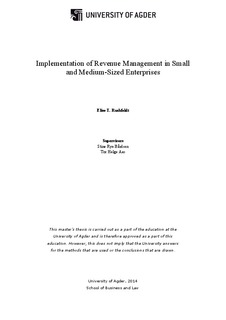Implementation of revenue management in small and medium-sized enterprises
Master thesis
Permanent lenke
http://hdl.handle.net/11250/275596Utgivelsesdato
2014Metadata
Vis full innførselSamlinger
Sammendrag
The purpose of this study has been to look at small and medium-sized enterprises
(SME) in the culture and tourism industry and their antecedents for successful
implementation of revenue management. The ten firms that are the basis for this study
are all located in Southern Norway, and have participated in a year and a half long
seminar in revenue management offered by the Arena USUS cluster. The group of
firms are quite varied, ranging over different sub-industries within the tourism and
culture industry. 60% of the firms have a commercial focus, and 40% have a noncommercial
focus.
This study is conduced as a qualitative multiple-case study, and each firm has been
interviewed using semi-structured interviews. The aim of this study has been to add to
the limited research done on implementing revenue management in SMEs. The
framework for analysis offered a guideline for what factors might lead to a high
degree of implementation or revenue management in SMEs based on factors that have
been shown to be important for firms in general. The framework suggests that
absorptive capacity, change agents, and a structured change process may be
significant for an SME during the implementation process.
The results showed that the firms could be split into three groups based on their level
of implementation: firms with a high degree of implementation, firms with little
degree of implementation, and firms with no degree of implementation. The factors
from the framework seem to be significant for a firm to achieve a high level of
implementation. These do not seem to differ based on the firm’s commercial or noncommercial focus.
Beskrivelse
Masteroppgave økonomi og administrasjon- Universitetet i Agder, 2014
